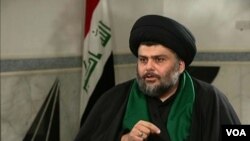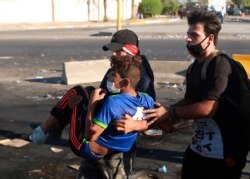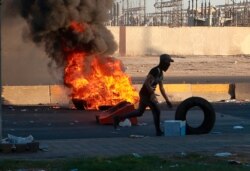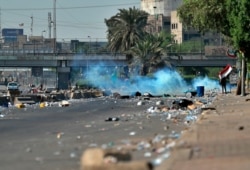One of Iraq's most influential clerics has called for Iraq's government to resign as anti-government protesters gathered in Baghdad for a fourth day of demonstrations against unemployment, poor public services and corruption.
Moqtada al-Sadr, the former Shiite militia leader who leads the largest opposition bloc in parliament, said in a statement Friday that "the government should resign and early elections should be held under U.N. supervision."
Iraqi forces have been opening fire on protesters, and medical and security sources say at least 53 people have been killed this week.
On Friday, Iraqi security forces again opened fire on protesters. Journalists on the scene reported that police appeared to be shooting directly at protesters and not into the air.
Witnesses say at least 10 people were killed Friday and many more injured.
The International Committee of the Red Cross (ICRC) issued a statement Friday saying "the deaths of civilians and the growing number of wounded at the ongoing protests across the country is particularly worrying, as is the use of firearms for restoring public order."
The ICRC has called on both sides to show restraint as it monitors developments on the ground.
'Bitter medicine'
Earlier, Iraq Prime Minister Adel Abdul-Mahdi, during a televised address to the nation, called on protesters to go home, saying their "legitimate demands" had been heard.
Abdul-Mahdi said that the security measures, including the temporary curfew imposed, were "difficult choices" but they were needed like "bitter medicine" that had to be swallowed.
Along with at least 53 people killed, hundreds of people have been wounded since the demonstrations began Tuesday. The demonstrations have spread in Baghdad and in areas south of the capital.
The protests are the first major challenge to Abdul-Mahdi, who formed his government a year ago.
Investigation ordered
The government blamed the violence on "groups of riot inciters" and said security forces worked to protect the safety of peaceful protesters.
Iraq's parliament has ordered a probe into the violence.
Many Iraqi citizens blame politicians and government officials for the corruption that has prevented the country from rebounding from years of sectarian violence and the battle to defeat Islamic State militants, who at one point controlled large areas in the northern and western part of the country.
At his weekly Cabinet meeting earlier this week, the prime minister released a statement promising jobs for graduates. He also ordered the oil ministry and other government agencies to apply a 50 percent quota for local workers in future contracts with foreign countries.








